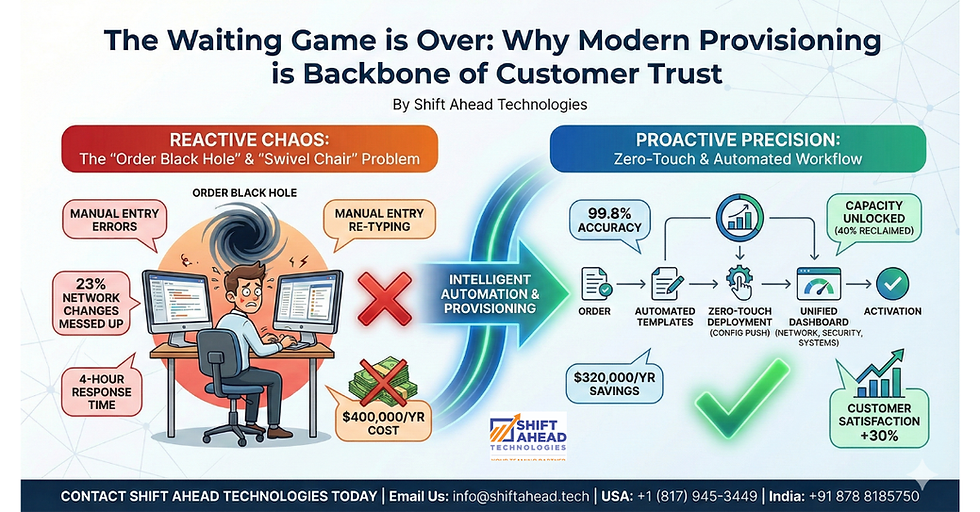10 Top Essentials For Managing NOC To Improve Performance
- Rajeeb Ghosh
- Oct 3, 2024
- 3 min read
Updated: Oct 22, 2024
.

Managing a NOC isn’t as straightforward. Companies face many diverse challenges that make NOC management a challenge. But fortunately, these tips can help. So, ShiftAhead, a leading NOC service provider, provides ten quick tips to manage NOC efficiently and optimize its operations.
1. Build an Operational Structure
Optimize your NOC with an efficient operational structure that comprises an experience NOC team. In addition, you must factor in three essential elements – people, process, and platform to cover every crucial aspect of NOC.
2. Track Meaningful Metrics
Many NOCs help companies track metrics to fulfill SLA needs. But not all of them select KPIs that provide visibility into operations, signifying their size and scale, and demonstrate performance about organizational objectives. Thus, while deciding the metrics, NOCs must select the most relevant and meaningful ones in their context for continuous, effective, and value-driven tracking.
3. Customize HR Strategy
Focus on creating a data-driven staffing plan. You may assign every engineer to a particular tier to keep track of the number of resources you have for every skill level. On the other hand, the relevant metrics you’ve chosen help you identify critical areas and times where you encounter staff shortages.
In addition, you must factor in holidays, leaves, etc., to maintain staff levels and chalk out training schedules to keep the resources updated.
4. Create and Implement a BCP
BCP refers to a Business Continuity Plan. It is a formal plan that enables the management to ensure uninterrupted operational continuity. BCP must cover everything from temporary outages to widespread damages.
It must also include an analysis of all organizational threats, an actionable items list, contact information of the concerned, backup steps, relocation sites in case of interruptions, and collaboration guidelines for all the organizational departments.
5. Ensure Service Quality
NOC service providers are continuously required to maintain high standard quality of service. But one cannot maintain quality without a proper program in place. The key to doing it is implementing a quality assurance (QA) program. It should comprise maintaining up-to-date runbooks outlining the client-compliant handling procedure and accurate and regular reporting and monitoring.
6. Incorporate ITIL
Implementing a standardized process framework like ITIL, FCAPS, or MOF can help optimize NOC performance. These frameworks provide guidelines to operationalize and document your NOC’s functions, roles, and functions.
ITIL, in particular, guides in developing, maintaining, and enhancing IT services, thus proving to be helpful in any NOC operation. It is a popular framework that provides best practices while delivering technical support services and accommodating the company’s customized processes.
7. Keep Runbooks Updated
Out-of-date runbooks can negatively impact the NOC operations. But to avoid it, companies must develop comprehensive runbooks and keep them updated.
It should start by documenting the tools and procedures required to deliver high-quality NOC services for every cataloged service. Runbooks should serve as a single source of truth for all stakeholders.
8. Integrate the Necessary Platforms and Tools
Handling NOC operations manually can result in inefficiencies. Let alone the errors that may arise from them. Accordingly, companies must consolidate all these tools and platforms to streamline their view. It includes consolidating email, text, voice, customer portals, documentation, workflow management tools, etc., in a single dashboard to look at everything.
9. Manage Costs
While designing a NOC, companies must keep provisions for frontend and backend staff, keep funds for update-related training, allocate resources for QA, dedicate an adequate budget to cloud storage, prepare for software licensing costs, and invest adequately in compliance.
10. Ensure Scalability
With business, the NOC also should scale efficiently and seamlessly. Scalability must be part of the initial plan and not an afterthought.
While planning for it, companies must limit staff use to around 80-85 percent, build additional capacity into tools to have some provision for growth, implement a flexible framework suited to organizational needs and maintain an architecture that allows deployment of other demand-based server resources.
Need NOC service providers for your company? Partner with ShiftAhead! We ensure end-to-end NOC management with 24/7 network remote monitoring, customer support, technical assistance, and many other services. Our NOC specialists work with integrity levels equivalent to your in-house staff and can deliver 40-50 percent operational savings. Click here to know more.

.png)



Comments